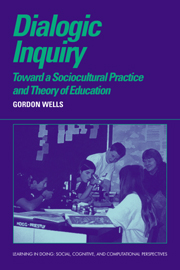Book contents
- Frontmatter
- Contents
- Conventions of Transcription
- Introduction
- Part I Establishing the Theoretical Framework
- 1 The Complementary Contributions of Halliday and Vygotsky to a “Language-based Theory of Learning”
- 2 In Search of Knowledge
- 3 Discourse and Knowing in the Classroom
- Part II Discourse, Learning, and Teaching
- Part III Learning and Teaching in the zpd
- Appendix I A Social Constructivist Model of Learning and Teaching
- Appendix II Categories for the Analysis of Discourse
- References
- Index of Authors
- Index of Subjects
- Title in the series
1 - The Complementary Contributions of Halliday and Vygotsky to a “Language-based Theory of Learning”
Published online by Cambridge University Press: 09 November 2009
- Frontmatter
- Contents
- Conventions of Transcription
- Introduction
- Part I Establishing the Theoretical Framework
- 1 The Complementary Contributions of Halliday and Vygotsky to a “Language-based Theory of Learning”
- 2 In Search of Knowledge
- 3 Discourse and Knowing in the Classroom
- Part II Discourse, Learning, and Teaching
- Part III Learning and Teaching in the zpd
- Appendix I A Social Constructivist Model of Learning and Teaching
- Appendix II Categories for the Analysis of Discourse
- References
- Index of Authors
- Index of Subjects
- Title in the series
Summary
When children learn language, they are not simply engaging in one type of learning among many; rather, they are learning the foundations of learning itself. The distinctive characteristic of human learning is that it is a process of making meaning – a semiotic process; and the prototypical form of human semiotic is language. Hence the ontogenesis of language is at the same time the ontogenesis of learning.
Halliday, 1993a, p. 93It is with this bold claim that Halliday opens the article, “Towards a language-based theory of learning” (hereafter, LTL), in which he condenses the conclusions of a lifetime's work on language and its development (Halliday, 1993a). In reading it, I was strongly reminded of Vygotsky's similar claims about the role of language and other “psychological tools” in intellectual development. In this chapter, my aim is to demonstrate the compatibility of these two language-based theories of human development as a way of creating a theoretical framework within which to consider the centrality of linguistic discourse in learning and teaching.
Long-Term Goals and the Choice of a Genetic Approach
There can be no doubt that both Vygotsky and Halliday have made major contributions to their chosen disciplines, Vygotsky in psychology and Halliday in linguistics. However, because of the breadth of their conceptions of their subjects, the impact of their work has also been felt far beyond their “home” disciplines, and perhaps nowhere more strongly than in the field of education. Indeed, both scholars devoted a considerable amount of energy to putting their theoretical ideas to practical use in attempts to improve the quality of children's educational experience.
- Type
- Chapter
- Information
- Dialogic InquiryTowards a Socio-cultural Practice and Theory of Education, pp. 3 - 50Publisher: Cambridge University PressPrint publication year: 1999
- 1
- Cited by



